#design principle
Explore tagged Tumblr posts
Text
Worksheet 2 - Contrast
Image 1
Color Contrast
Warm vs. Cold: The contrast between the warm yellow of the illuminated window and the cool blue of the surrounding buildings creates a strong visual impact.
Light and Dark Contrast
The bright yellow window stands out against the darker blue background.

Image 2
Shape Contrast:
The hard, straight lines of the rectangles contrast with the soft, curved lines of the ellipse.

8 notes
·
View notes
Text

Save me yi nine sols
(You should play nine sols it’s very very fun)
#nine sols#a break from your regularly scheduled op stuff to bring you this doodle#catboy brainrot hours. yi is such a guy#absolutely obsessed with his design and animations ngl#I’m not very good at the game lmao.#but hey that’s what story mode is for!#honestly so in love with the aesthetic of the game in general…..#I have a lot of thoughts on how modernization of Chinese and other East Asian cultures in design usually just means westernization#this is why I just. on principle. have not watched legend of Korra yet#this game just combines science fiction aesthetic with Chinese design patterns so incredibly well
1K notes
·
View notes
Note
Vascos modern outfit in that recent sketch is so cool. On what real clothing is it based?
I was mostly winging it, to be honest. Last year there was some talk of Vasco having a motorcycle and how spiffy he could potentially look in biker gear, so I leaned somewhat into that direction.


But then I got kinda sidetracked and I think his coat started resembling Kaneda's jacket from Akira.
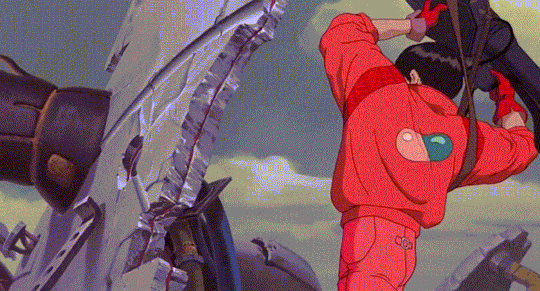
#I could've made it Kaneda's jacket it's such an iconic design#I feel like Vasco would enjoy Akira just in general now that I think about it#I should make a list of what their favorite movies would be#BUT I'm -needlessly- stubborn about their color coding#Machete shouldn't wear blue and Vasco shouldn't wear red I have my principles#answered#anonymous
434 notes
·
View notes
Text

For my beloved mutual who asked for pretty-god-Janus thighs. And my other beloved mutual who asked me to make that design in the first place
KtS(aWtG) AU by @greenninjagal-blog ! :)
#me? gay for janus ((((ethan ekans)))) sanders? never#sorry i said 'janus' in my head while typing that and 'ethan ekans' came to mind completely naturally.#he's not even human here so that makes no sense considering he has no last name. nevertheless‚#drawing#art#digital#cw suggestive#<- because it has a ''maybe don't look at it on the clock'' vibe. a bit#sanders sides#janus sanders#ts janus#The Principle Of The Design Is That He Has To Be Pretty‚ Don't @ Me About How Pretty-ified He Is (also i love men)#ktsawtg
169 notes
·
View notes
Text
Use of The 60-30-10 Color Rule in Severance
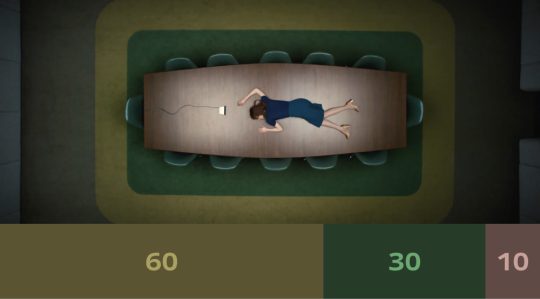

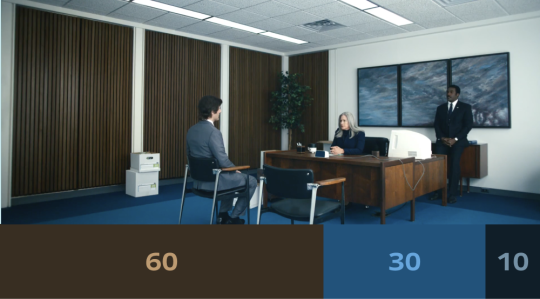

“Perhaps due to the deep symbolism of colors or meticulous aesthetic control, Severance employs an extremely restrained color palette in all its scenes. Most scenes feature only three colors, often presented in a 60:30:10 ratio, following the 60-30-10 color rule in design.
The 60-30-10 color rule is a design principle that creates visual harmony by dividing colors into a balanced ratio: 60% dominant color (main area), 30% secondary color (supporting elements), and 10% accent color (highlights).
This rule works because it naturally establishes hierarchy and contrast, preventing visual clutter while ensuring a cohesive and aesthetically pleasing composition. It is widely used in interior design, graphic design, and branding to create balanced and engaging visuals.”
youtube
#severance color theory#severance design#severance#60-30-10 rule#color theory#graphic design#design principles#set design#color relativity
101 notes
·
View notes
Text
looking at their release date and spinning excitedly



looking at their release date and spinning excitedly
#the talos principle reawakened#the talos principle#sorry athena you needed a background you are too White#sorry athena [2] i only made a model with your t2 design#sorry milton i havent made you any model yet#3d art
136 notes
·
View notes
Text
can i confess something else that will absolutely get me stoned in the town square since im dropping my unpopular opinions. I don’t like altean broadsword Lance. i already disliked red paladin Lance. the broadsword was like rubbing salt in the wound. why couldn’t he have his own niche. why was his character development just making him keith. i understand that it was like “he accepts that he doesn’t have to be a leader and excels as a co-leader and you can find happiness that way yada yada yada”. but you could’ve done that without making him keith. also now give him something unique, cool, that falls in line with his sniper bit. i’m not saying just give him another gun, im saying give him something quiet and lethal. like a garotte. yeah i want garotte lance.
i yap a lot more in my notes by the way if you were interested in other unpopular opinions. don’t send me hate messages or comments i won’t read it and will block viciously i also will not be debating this this is my hill to die on <3
#voltron#if you wanna hate on me uh maybe don’t#i just also think everyone’s writing was lazy except allura’s by the end#i don’t go into RP/BP klance posts and hate on them so don’t come into my space i’m warning you im liberal with the block button#that’s my OPINIOOONNNNNN#voltron legendary defender#moths unpopular opinions#i hate red paladin lance and black paladin keith im not sorry#i also dislike the idea that the black paladin has a designated right hand man (figuratively)#that feels unfair in a way i can’t explain#to me#black paladin is someone that creates harmony in the group#not necessarily is the Ultimate Most Important dude#but the guy that can listen to all the noise and filter it out and come up with reasonable ideas and facilitate discussion#and make well informed snap decisions to guide the team#i don’t think there’s space for a right hand#moth speaks#lance mcclain#and i hate that shiro got side lined because they shot themselves in the foy#foot#anyways having a lion swap betrays the fundamentals of voltron we were introduced to#you can’t introduce a hard magic system and then say no thanks#like oh ok i guess it doesn’t matter if the lion chooses the paladin whatever#which by the way is my biggest issue with season one#i think it was structured badly and having allura designate lions from the get go also betrayed the principle#which you could argue for the lion swap using that argument but lance is really the only one who was without a doubt chosen by his lion#so#no#anyways#thanks for listening to me yap
91 notes
·
View notes
Note
On the topic of horror, how do you make a grim subject matter feel silly spookville experience instead of actually scary? For example, the Luigi Mansion games, the Disney Haunted Mansion ride, the Medevil games, etc?
The counter to anything terrifying, off-putting, or grim is cuteness. This is done by exaggerating certain features that humans typically find endearing and downplaying the features that humans find alarming, while keeping the visual recognizable. This works with animals.

It works with the undead.
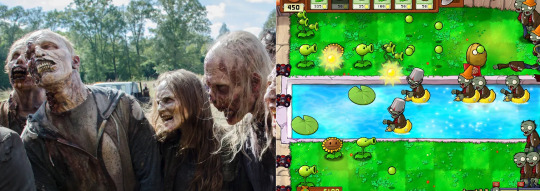
It works with just about anything.
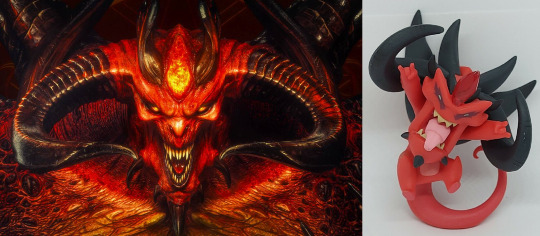
Humans tend to look at a few things to determine cuteness - the main two being proportion and the removal or masking of traits that we find scary or off-putting.

In terms of proportion, we tend to look favorably on things with the proportions of children, babies especially. Babies have much larger heads relative to their bodies, arms, and legs. If the scary thing is proportioned like a baby or child, we are much more likely to look at it favorably rather than with fear. Most examples of something cute based off of something scary use body proportions closer to a child's body (or the animal equivalent) than an adult's.

Second, we reduce the "fear" factor by simplifying, downplaying, or removing any elements of body horror or things that make people feel uneasy. This typically means any markers of injury, illness, pain, danger, or just obviously unnatural. Notice the mask on the left has many wrinkles in the skin, the unnatural white eyes, the off-putting shading, the heavy emphasis on the yellow teeth and blood-red gums, and the realistic proportions that intentionally push this mask into the uncanny valley for the unease it causes. Now consider the right mask - everything is simplified, with smooth lines and the only sharp edges being on the smile itself. Bright colors, a stylized happy face, with no features that could be considered off-putting.

Combine the use of proportions with the removal of things that induce unease in the viewer, and you get something cute and less scary. This also works in reverse - take something normally cute, change the proportions, and add in the things that induce unease in the viewer and it becomes scary. Artists take advantage of our inherent mental associations with these things to make things cute or creepy.
[Join us on Discord] and/or [Support us on Patreon]
Got a burning question you want answered?
Short questions: Ask a Game Dev on Twitter
Short questions: Ask a Game Dev on BlueSky
Long questions: Ask a Game Dev on Tumblr
Frequent Questions: The FAQ
51 notes
·
View notes
Note
I have no other place to yap this to so I apologise in advance.
I find it interesting in Alhaitham and Kaveh’s voicelines they tend to talk about each other A LOT in a way of complaining. Such as in Alhaitham’s Good night voiceline where he says that he’d prefer that Kaveh wouldn’t be home at all because all the chaos and noise he makes in the dead of the night. Or in Kaveh’s Good Morning voiceline where he says that he hopes that you don't run into someone who ruins your day first thing in the morning.
I guess it’s what makes other people think that they despise each other’s company. Yet they’re always viewed as a pair and Alhaitham could’ve kicked Kaveh out of the house ages ago. But what’s your opinion on that?
Hiya! there's no need to apologise, this is a safe space for all haikaveh! When I tell you your ask is scratching my brain I mean ITCHING, I have so many thoughts about this part of their dynamic so thank you for enabling me <3 This turned out to be rather long, so I hope it’s helpful to you!
The contention in both Alhaitham and Kaveh’s character stories and voice lines seems to be to create intrigue about the two as individuals, and, in turn, their relationship.
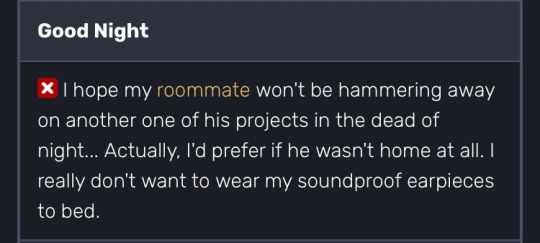

Alhaitham’s ‘good night’ voice line instantly serves as a contradiction to his character. It’s interesting, and telling, that Alhaitham, who is essentially Kaveh’s landlord, and mentions this within his fourth character story, alludes to Kaveh by using ‘roommate’ rather than ‘tenant’. ‘Landlord’ evokes a position of authority over the tenant, whereas ‘roommate’ indicates an equality between two people sharing a house – since it’s Alhaitham who advocates for the term ‘roommate’, it’s telling that, as opposed to what Kaveh believes, Alhaitham wants to establish equality between them.

In terms of what Alhaitham says in this voice line, it explicitly raises a contradiction in the form of a question: if Alhaitham is truly bothered by his roommate’s antics, why doesn’t he simply evict Kaveh?
This is relevant as this question is also posed when we initially meet Kaveh within the Archon Quest, as Kaveh states he dislikes Alhaitham’s personality, to which Alhaitham responds by saying if he bothers Kaveh so much, Kaveh always has the option to move out of the house – to which Kaveh perceives as a threat, only to then dismiss this as Alhaitham ‘changing the subject’, which seems to mean that this ‘threat’ is taken as baseless. As this isn’t called back to, this seems to be the case.


There is no real threat of eviction, and regardless of their disputes, Alhaitham ultimately gives Kaveh no ultimatum to move out. In fact, as discussed here (page 27), as we are meeting Alhaitham and Kaveh for the first time, Alhaitham allowing Kaveh to live with him contradicts his established character of living a life free of inconvenience. This instantly creates intrigue around his and Kaveh’s dynamic – who is Kaveh to Alhaitham for this exception to be made to Alhaitham’s peaceful way of life?
(An additional note of interest is that Alhaitham’s solution to the noise problem seems to be more uncomfortable than calling on Kaveh and telling him to stop his work. Alhaitham says that he’d rather not wear his noise-cancelling earpieces to bed, implying that he does so when noise is a problem at night. However, there’s no mention of Kaveh being stubborn when confronting this issue, which is why he takes to wearing his ear pieces, or any mention of confrontation at all. From this voice-line, it seems that Alhaitham avoids interaction by opting for the least comfortable option, which can be a contradiction to his character. As this is a rather brief voice-line, it’s difficult to ascertain why, but I like the idea that Kaveh is productive at night, and Alhaitham prefers not to impose on Kaveh’s work process – but this is more a headcanon than evidenced interpretation.)
Returning back to the contradiction within this voice-line, at a surface glance, this does appear to be a general complaint about Kaveh, and this can be found in Alhaitham’s lines about Kaveh, and also when discussing Tighnari. Alhaitham refers to Kaveh as ‘overly sensitive’, and ‘constantly making a fuss’.
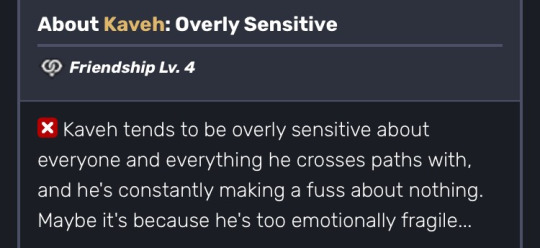
These can easily read solely as complaints, but when looking to the original CN translation, another interpretation can be found here. Alhaitham describes Kaveh as ‘caring’ or ‘tender’, which is exactly how Kaveh is described within the 3.6 special program (as per minimushiroom on twt), which can allude to how Kaveh is considerate to a fault, in that this serves as a detriment to himself.
This can be seen in Alhaitham’s other Kaveh-centred voice-line, in which he describes Kaveh buying keychains in order to provide meals for sick children, even though healthcare is free in Sumeru. Alhaitham clearly holds the view that this was a redundant action, as Kaveh, being in debt, most likely doesn’t have the money to spend on such investments that are, evidently, dubious.
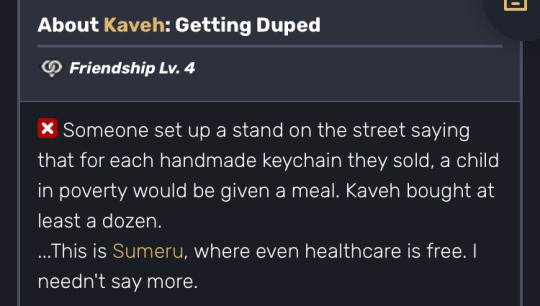
As Alhaitham provides a rational view here, this contrasts with Kaveh’s act of generosity fuelled by emotion – which highlights the contention Alhaitham has with Kaveh, in that Kaveh places himself in dangerous situations for the sake of others. However, as this can be perceived as a solely derisive line, this essential context is lacking, and can be easily misconstrued. (I think the EN translation here also coincides with this narrative, as minimushiroom notes that the original CN has Alhaitham refer to Kaveh’s sensitivity in a positive way, rather than contemptuously, as the English can be interpreted as.)
Kaveh, similarly, can be seen to complain about Alhaitham in his own voice-lines. This can be seen in the 'Good Morning' voice-line you've mentioned, where Kaveh complains about having to see Alhaitham in the morning, which 'ruins' his day. Additionally, Kaveh's voice-lines discussing Alhaitham refer to Alhaitham as ‘infuriating’ and not wanting to give Alhaitham the satisfaction of thanking him, despite Alhaitham helping him out. However, there is more nuance in these voice-lines than Kaveh simply ‘disliking’ Alhaitham, as this dislike is never stated - rather that he and Alhaitham have a difficult relationship in comparison to the ‘close’ friendship of their past.


Kaveh describes their relationship being a ‘mixed bag’, of both negatives and positives, as well as establishing a thorough understanding of Alhaitham, where other people may misinterpret Alhaitham as they ‘don’t know him well enough’. Additionally, Kaveh notes that he knows that Alhaitham can present himself in a more ‘likeable’ manner, but that Alhaitham refuses to do so, which refers to Kaveh’s contention with Alhaitham discussed within his character stories. This, in turn, generates curiosity, as it appears that Kaveh holds an in-depth knowledge of Alhaitham that the player isn’t privy to.
Referring back to Alhaitham’s ‘Good Night’ voiceline, the question raised is, if Alhaitham has a problem with Kaveh, why doesn’t he just evict Kaveh? And the answer can be found by digging further into Alhaitham’s character stories. Looking to Alhaitham’s fourth character story, it states that he is aware of the dissatisfaction Kaveh may have with their living arrangement but that ‘it matters not to him’.
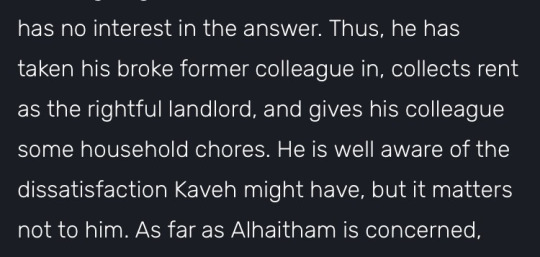
This means that he is aware that Kaveh may be unhappy with having to rely on someone else for a stable livelihood, something which his pride doesn’t naturally allow, but that this is also exacerbated due to their previous falling out and the current contentions Kaveh has with him.
At first, this can seem rather abrasive, which does fall in line with Alhaitham’s egoism as this doesn’t directly impact ‘the self’ (discussed further here), however, what immediately follows is Alhaitham’s belief that he and Kaveh are mirrors, in that his own perspective of the world will be enhanced - in the og CN, ‘completed’ -by Kaveh’s own world view.

The implication generated here with the explicit term ‘mirror’, is that, just as Alhaitham benefits from Kaveh, Kaveh, in turn, can benefit from Alhaitham. (As a side note, it is interesting then that the voice-lines in question can be seen to mirror each other – Kaveh mentions Alhaitham in ‘Good Morning’ whereas Alhaitham mentions Kaveh in ‘Good Night’.)
Returning back to Alhaitham’s character story, rather than merely reflecting each other philosophically speaking, I’d say that this also points to their respective progression as people, not just scholars.
To me, this is reminiscent of what Alhaitham says to Kaveh in A Parade of Providence – being ‘correct’, ultimately, doesn’t matter, as there is no ‘correct’ path in life, meaning that there is no ‘correct’ philosophy to shape and guide a person. Rather, Alhaitham asserts that, ultimately, their opposing philosophies are not the issue that exists between them.


The issue that does exist, then, can be surmised from Alhaitham’s actions during the event (discussed further here), in which he researches into Sachin to gauge his influence over Kaveh’s father journeying into the desert, with implicit hopes of providing closure for Kaveh, and potentially assuaging Kaveh’s guilt. This is a personal act with a personal motive; the underlying motive being concern, as opposed to an assertion of ‘correctness’.
In my opinion, I think Alhaitham’s actions during A Parade of Providence are a direct reference, and fulfilment, of Kaveh’s fifth character story. I’ve discussed here that the main reason for the ending of their friendship was them asserting the correctness of a philosophy over the other, and proposing one philosophy as the ‘solution’ to the other’s perceived flaws.
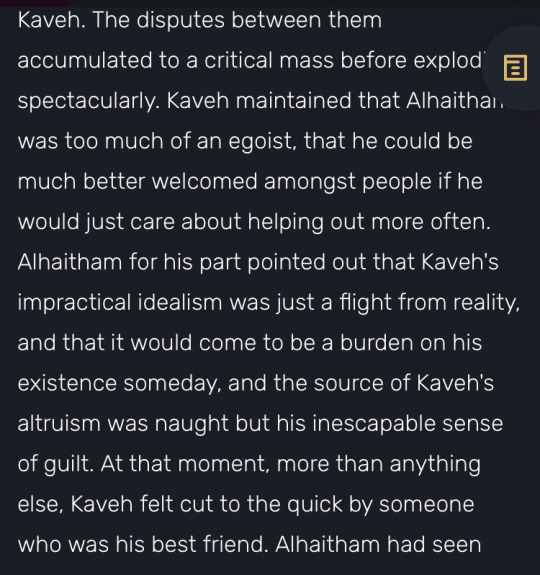

Here Alhaitham can be seen to use Kaveh’s past as the reason for his excessive altruism, implicitly referring to Kaveh’s guilt over being the supposed catalyst for his father’s demise. This final comment of Alhaitham’s appears to be the first time this has been mentioned between them, and it’s enough to be perceived as weaponisation – leading to Kaveh severing their friendship.
In A Parade of Providence, Alhaitham is shown to only have taken the role of commentator to research into Sachin, whose research we are told (by Kaveh), he has no explicit interest in, and it is heavily implied that the only reason he looked further into Sachin, was to prove to link between Sachin and Kaveh’s father. Alhaitham seems to want to absolve Kaveh of this past guilt in hopes that Kaveh will stop placing himself in the cycle of self-sabotage.
For me, when viewing this as a parallel, it highlights that Alhaitham’s motivation in speaking out during their days as students was out of concern for Kaveh, although while holding egoism as ultimately beneficial, and therefore perceivably ‘correct’. The ‘issue’ they’re currently debating is not expressly stated, and although it is unclear if Kaveh understands the implication (as discussed here), as ‘correctness’ has been overturned, there seems to be little left than the personal.
Relating this back to Alhaitham’s fourth character story, for me, Alhaitham referring to Kaveh as a mirror isn’t just referring to Kaveh as a scholar, but a person as a whole. As Alhaitham seeks to improve himself, personally, through Kaveh, it seems that he hopes to be able to benefit Kaveh in turn.
As for Kaveh’s complaints regarding Alhaitham, these can be contextualised within his own character stories. As Kaveh ultimately severed the friendship between him and Alhaitham, Alhaitham offering Kaveh to live with him, despite Kaveh revoking his previous understanding of Alhaitham (as discussed here, page 67), causes Kaveh to be overtly suspicious.
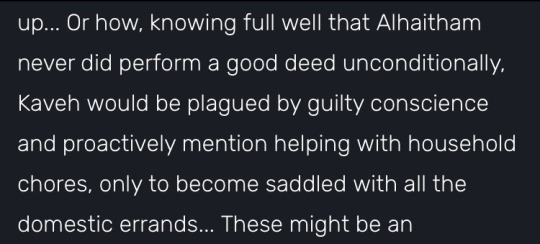
In Kaveh’s Old Sketchbook, it is mentioned that Kaveh believes there to be an ulterior motive for Alhaitham inviting him to share a house, as he believes that Alhaitham wouldn’t do something for someone else without an exchange.
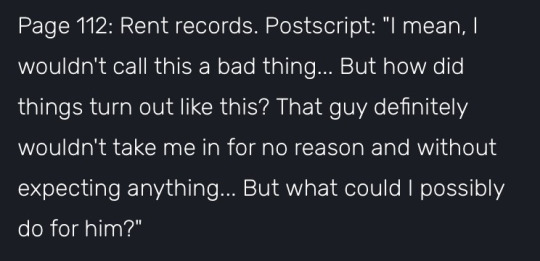
Kaveh, then, openly distrusts Alhaitham due to this unspoken motive, and although he takes on chores to ease his sense of guilt of being a perceived burden, a contention arises here. Due to their previously ended friendship, and with how Alhaitham hurt Kaveh, and how Kaveh may believe he hurt Alhaitham (discussed here), Kaveh sees no reason for Alhaitham to want him around – he treats their relationship as an exchange, asking what Alhaitham could possibly want for him.
Although Alhaitham views Kaveh as a mirror, and therefore, respects Kaveh’s perspectives, Kaveh can potentially view their opposing philosophies as a negative rather than a positive as he had done in the past (as discussed here), as it, perceivably, was what led to the end of their friendship. In this, Kaveh views Alhaitham as disparaging him and his views. As mentioned in his character story, he has no reservations in telling Alhaitham of his debt as Alhaitham has already seen through him in the past, and yet again, upon meeting at the tavern.
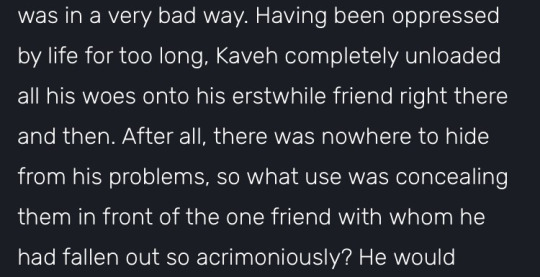
Although Alhaitham perceivably views him unfavourably, and his comments and complaints appear to propagate this interpretation, Alhaitham also seems to have no issue with keeping Kaveh around, and interacting with Kaveh, regardless of the problems Kaveh expressly has with him.
To Kaveh, it could be that as Alhaitham has already seen the worst of him, and appears to have no real issue with their stilted rapport, there is no point in donning a front and using niceties. He is open with his issues with Alhaitham, and, in turn, Alhaitham is open with him.
This appears to be a dual negative and positive for Kaveh, as he describes Alhaitham’s constancy as ‘the most unshakable part of one's past is a friend that will never change’. In this sense, his unsteady rapport with Alhaitham is reliable, and therefore, has no reason to change.

Clearly, there is a large disconnect between Alhaitham’s view of Kaveh and how Kaveh perceives Alhaitham’s view of him. As previously mentioned in the discussion of A Parade of Providence, there is an unspoken ‘issue’ between them, and this can be interpreted as dire misconceptions borne from miscommunication.
As discussed, Kaveh and Alhaitham reference each other a lot in their respective voice-lines and their character stories. This alone is enough to connect them, regardless of the cruciality of their mirror motif, as they are key figures of each other’s past, present, and seemingly, future. Despite this, it’s as you say, there’s a common perception to view them as mutually disliking each other, and, to me, this is based upon their first initial interaction, and the way they refer to each other in their own character stories and voice-lines.
It’s notable that Alhaitham refers to Kaveh in his voice-lines when Kaveh is not explicitly relevant, such as in his Good Night voice-line, and, most interestingly, when Alhaitham discusses Tighnari.

This could be because Alhaitham knows of Tighnari through Kaveh, but as this connection isn’t stated, it reads as Alhaitham mentioning Kaveh for no other reason than to complain about his perceived naivety regarding relations with others. But as this is a voice-line designated to discussing Tighnari, it’s interesting, and incredibly noticeable, that Alhaitham then discusses Kaveh instead. It’s similar to what Kaveh can be seen to do, and is observed to do by others, in relation to discussing Alhaitham.

When it comes to Kaveh, however, his complaining of Alhaitham can be seen to link with his process of dealing with troubles in his work. In his Hangout, he states that he takes his work to heart because he cares about it, which is expressed in the same quest in which Kaveh and the Traveller run into Alhaitham in the House of Daena (discussed further here, page 219).
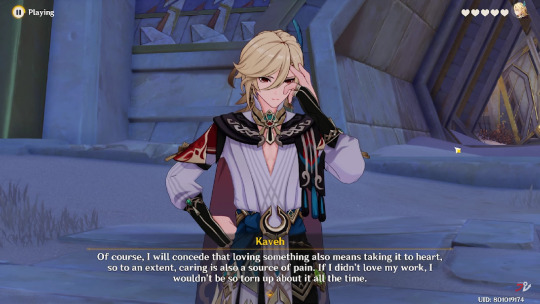
Drawing a parallel here can further contextualise Kaveh’s complaining of Alhaitham – if Kaveh truly disliked Alhaitham, there seems to be no reason for Alhaitham to remain so relevant to him, both in conversation, and in private thought. Additionally, Kaveh is described as an empathetic person, and when dealing with others, he is thusly seen to look for another perspective rather than act on his own subjective perspective.
Looking at his voice-line on Dori, for example, expresses his distaste for Dori pressuring him for Mora due to his debt, however, he also empathises with her, and states that he senses there must be a reason why Dori acts in such a way.

In contrast, this empathy can be perceived as missing in his treatment of Alhaitham, and therefore Kaveh complaining about Alhaitham can be perceived as blatant dislike – which contradicts Kaveh’s benevolence and empathy, which A Parade of Providence particularly stresses.
Kaveh’s treatment of Alhaitham can be seen as deliberately contradictory, as it can cause the player to question why Kaveh reacts in such a singular way to Alhaitham, just as why Alhaitham reacts in a singular way to Kaveh.
In reference to Alhaitham, whilst Alhaitham tends to complain about Kaveh in turn, his actions reveal him. He invites Kaveh to live with him, gives no eviction date, pays for Kaveh’s tabs willingly, (supposedly) buys wine as an apology, and goes out of his way to ensure dialogue with Kaveh – which contradicts his own character stories, in which he appears to favour solitude, and only greets those he considers his friends ‘with a nod or two’.

Moreover, Alhaitham is established as considering Kaveh a necessity to his ‘peaceful life’ he seeks to maintain (as discussed here), and can be seen to implicitly consider Kaveh one of his priorities within his Story Quest.
The idea that Alhaitham dislikes Kaveh seems to stem from Alhaitham being taken literally when voicing an opinion, or an issue, or simply joking, in reference to Kaveh – despite his character stories highlighting that Alhaitham often uses sarcasm in order to subvert expectations.

Alhaitham expressly states that he prefers to be seen as inscrutable, and unknown, by the general public, and uses subversion as a means to do so. In these character stories, Alhaitham openly encourages speculation of his own words.
Without this context, it seems easy to simplify Alhaitham to purely speaking factually when first addressing Kaveh in the Archon Quest – stating that having to explain things to Kaveh is ‘a nuisance’, and yet, it is overlooked that Alhaitham stays in the House of Daena, regardless, knowing Kaveh would find him again.
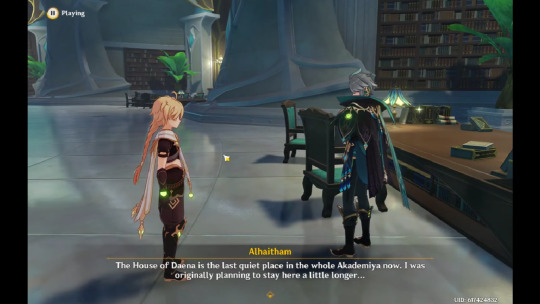
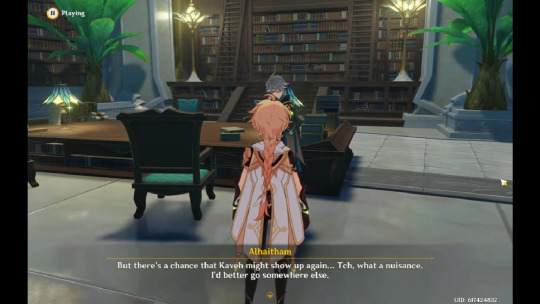
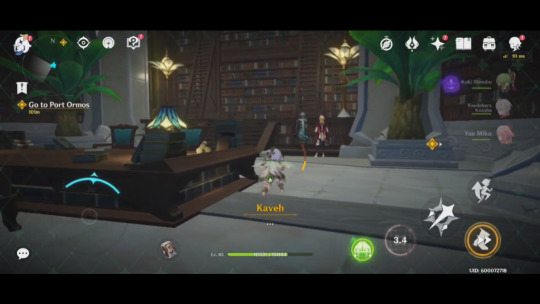
On the whole, in my opinion, Kaveh’s feelings towards Alhaitham cannot be simplified to ‘dislike’ as this is dually an inherent misunderstanding of his character, and of his and Alhaitham’s relationship, just as Alhaitham’s feelings towards Kaveh cannot be simplified to ‘dislike’ for this same reason.
In the beginning, Alhaitham and Kaveh are not supposed to be perceived as friendly, as Kaveh denies the association of ‘friends’, and Paimon describes them to the Traveller as ‘problematic’.

The reason for this is due to their character arcs being intertwined – the core issue is posed in Kaveh’s fifth character story, in that the question is raised if a compromise can be reached, if both sides of the mirror, can be balanced. At the beginning, they are entirely at odds, but even footing must be found.
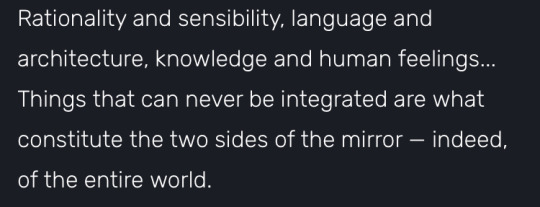
I’ve noticed a shift in online discourse after Cyno’s second story quest, as the progression in Alhaitham and Kaveh’s relationship is noticeable – deliberately, due to the flashback scene within their house (which I’ve discussed in detail here, page 122). To me, it’s more common to form the assumption that Alhaitham and Kaveh dislike each other in the Archon Quest, but with recent developments, and, hopefully, future ones, this perception is being overturned in online communities. Perhaps that’s just wishful thinking, but I’m still hopeful!
#haikaveh#kavetham#alhaitham#kaveh#genshin impact#thank you so much for your ask anon! it really ate away at my brain#haikaveh's writing is just so !?!?!? theres so many layers to peel back so a surface read of their relationship can be misconstrued as toxi#but ultimately i think these voice lines and details of their character stories are for people to question WHY they are Like That with#each other and it's one of the things i love about them that nothing is upfront or simple it really suits their themes so well#alhaitham constantly questions the world around him and flips language on its head and kaveh challenges the world with his ideals but works#with rigid principles of design and construction and he can't tell sarcasm from genuine praise which also adds to why he takes alhaitham's#words so personally... but this is improving now?? i am saying thank you cyno's second story quest <333#also the narrative that haikaveh can't stand each other seems to be more of a western thing from what i've seen online#and i think this is possibly due to the EN translation where the CN is less derisive or abrasive?#thank you to those who translate so the nuance is pointed out! <3
117 notes
·
View notes
Text
Sometimes you have to sit outside in the sun for a few minutes and eat a fruit while looking at green things. To combat the horrors.
#quite frankly it’s ridiculous#same principle as going on a stupid little daily walk#mental health#the fact that i need regular maintenance is a joke#what kind of design is this?#id like to speak to the manufacturer#but my warranty has clearly expired
269 notes
·
View notes
Text


Visual Diary 5
HARUKI MURAKAMI Book Collection Cover
by Suzanne Dean - creative director at Penguin’s VINTAGE
If you’ve ever read a Haruki Murakami book, you’ll know that venturing into any of his fictional worlds comes with an inevitable sense of mystery. And as a designer and also an avid Haruki Murakami reader, I pride myself on obsessing with not only the stories within his novels but also with the covers of each book I’ve ever gotten.
Suzanne—a creative director at Vintage—is the author of the covers for the above books, when she was asked to give Murakami's current catalogue a more cohesive look. That's when she came up with the concept of the symbolic circle.
Cultural Symbol
These circles on book covers regularly appear on packaging and printed materials in Japanese and Taiwanese. The consistent use of this iconic circle on book covers has silently conveyed the cultures of these two countries to readers.
Color contrast
The sharp contrast between black, white and red - a limited clor pallete but still creates a visually striking design.
Negative space
I also like the clever use of negative space. The result is a series of covers that not only look beautiful as a set, but also have hidden meanings within them, like the obscured image of a trunk in The Elephant Vanishes or Norwegian Wood’s tree trunks that double up as the legs of the story’s three central characters.
4 notes
·
View notes
Text
I think Arty should have a little white stripe in his hair… to hell with realism it’d be cute and novel…
#artemis fowl#i operate on warrior cats and slightly-anime principles of character design. realism be damned the more fun the merrier.#and glasses! arty needs glasses. idk something *fun* I love him but his little suit isn’t visually interesting like it used to be…
83 notes
·
View notes
Text

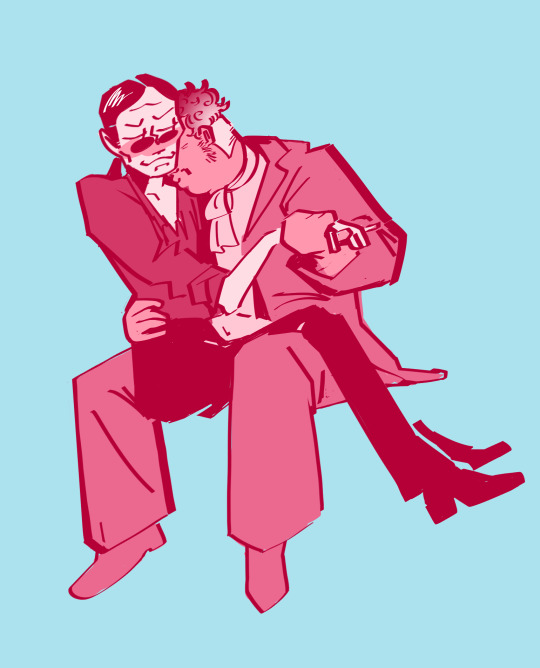
i think they'd be very silly about it
#good omens#i love my book designs dearly#nsftext#aziracrow#aziraphale#crowley#aziraphale good omens#crowley good omens#gomens#ineffable husbands#art#my art#everyone ignore that the decriminalisation of gay sex would have very little to do with them cause of their whole gender debacle#i think aziraphale is mostly bothered by the principle (lol) of the thing#book omens
691 notes
·
View notes
Text
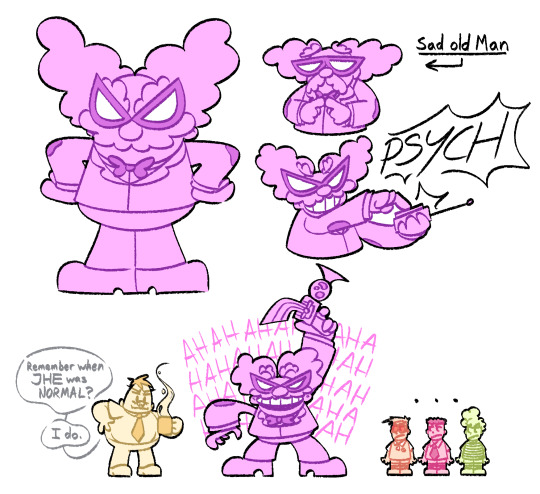
This man has a PhD.
————
I honestly love how unhinged this man is in the movie. He casually strolls into Jerome Horwitz Elementary, gets a job, immediately clocks Melvin as a suck up teacher's pet, then reveals his evil motive to a classroom of children. He carries around a portable cage in his pocket. He refused the Nobel prize because he was slighted (fair tbh). His first thought when seeing a man-shaped hole in the principle's office was that he'd found the right batshit insane place to use as cover.
What an iconic little maniac. He deserves a spin-off.
#captain underpants#professor poopypants#george beard#melvin sneedly#harold hutchins#benjamin krupp#principle krupp#we stan a short king#I wish there was a CU animated series where he just sticks around as the science teacher#If I can get that far into Redux he's definitely going to be a side character that the boys either have to thwart or employ in their scheme#I kinda prefer Pilkey Krupp’s design over my other version#Might return to it#(no you aren't going crazy--I do keep going back and editing the image due to mistakes I've realized after posting AGHAHS DGKJHASDFKJH)
189 notes
·
View notes
Text

Inscryptober Week 1: Transformation
I got kinda busy this month, so I'm a bit late. Just a bit. But I'm determined to participate, dammit, so now you get MS Paint shitposts from me, huzzah!
Anyways, I got a little bit literal about week 1's prompt and created the crossover of my dreams, and probably also P03's dreams. Mags and Grim-Gram of course transform into their animal forms from Act 1, and Leshy transforms into an elk.
#inscryption#inscryptober#leshy#p03#grimora#magnificus#transformers#beast wars#before you ask why they have hair#i'm abiding by the design principles of beast wars neo#the best tf show that nobody has ever seen#my art
81 notes
·
View notes